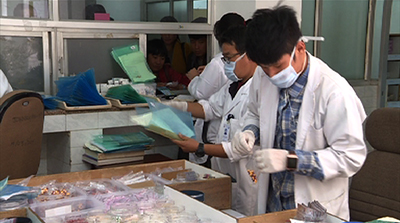 Antibiotics are not necessary for every illness. Instead, a good rest can work wonders for infections that our body can handle. So, sometimes what the patients need is plenty of rest and not antibiotics.
Antibiotics are not necessary for every illness. Instead, a good rest can work wonders for infections that our body can handle. So, sometimes what the patients need is plenty of rest and not antibiotics.
But what usually happens is that people go to see a doctor for minor illnesses like common cold and the doctor prescribes antibiotics. But common cold is a viral infection against which antibiotics do not work.
Prescribing antibiotics without proper examination of the illness is not a healthy treatment option, says Public Health England. Public Health England is an executive agency of the UK’s Department of Health.
Health officials in Bhutan agree that not every illness requires antibiotics. “When prescribing antibiotics to patients, it is very important for the clinician to examine the patient properly and find out whether antibiotic is really required or not,” said Doctor Pandup Tshering of the Director General of the Ministry of Health.
“Of, course there are different conditions. Specific diseases require antibiotics and there are some conditions, which do not require antibiotics. That’s why it is very important for clinicians to firstly take proper history from the patient, and also examine the patient properly.”
Therefore, for illnesses that can get well on its own or that our body can fight on its own, a better advice would be to ask the patients to get plenty of rest.
Viral infections such as common cold or bronchitis, health officials say, can heal on its own in few days without any medical intervention.
“If we take common cold, initially we can just give some symptomatic treatment. For example, if a patient has fever we can give paracetamol. If a patient has running nose, we can give some antihistamines and ask the patient to take rest and drink lots of hot water. Only if the patient doesn’t get well in two or three days time, then the patient should come back and see the doctor again.”
Prescribing antibiotics even when not required is termed as irrational prescribing by the health officials. It is one of the main causes of antimicrobial resistance.
Antimicrobial resistance refers to the ability of microorganisms to resist effects of medication used to treat them. A recent World Health Organization Report expressed concerns over the increasing resistance of bacteria to antibiotics.
Antibiotics losing ground to bacteria is a cause for huge concern. When a bacterium becomes immune to antibiotic, that medicine becomes less effective, which means the patients require longer, more toxic and expensive treatment in hospital.
Both patients and doctors have parts to play in stopping the rise of drug-resistant infections. Patients can avoid seeing doctor for minor illnesses and doctors, on the other hand, can advise patients to take rest instead of prescribing antibiotics unnecessarily.










